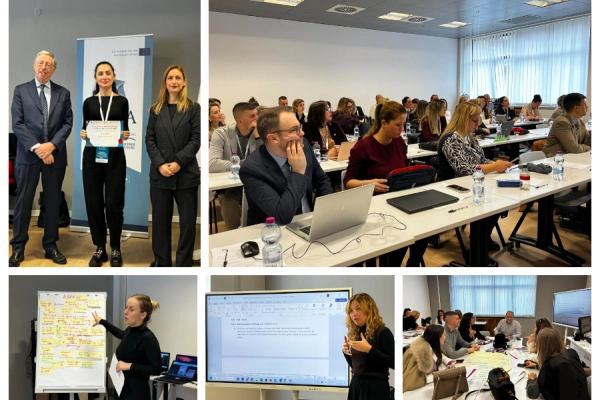
ReSPA and SNA conclude the “Strategic Foresight in Governments” Workshop
19 November 2025, Rome, Italy
ReSPA, in close cooperation with the Italian National School of Administration (SNA), successfully concluded the workshop “Strategic Foresight in Governments.” The activity marks the final event of the second cycle of the regional capacity-building programme devoted to strengthening forward-looking governance across the Western Balkans, supported by the Italian Ministry of Foreign Affairs.
Delivered through a blended learning format, the workshop combined an online introductory course on Anticipatory Innovation Governance and Strategic Foresight (10–16 November 2025) with a three-day in-person programme held in Rome (18–20 November 2025). The initiative equipped public officials with tools to anticipate emerging policy challenges and to apply structured foresight approaches in their respective administrations.
Strengthening capacities for future-ready public administrations
Throughout the in-person sessions in Rome, participants worked with foresight tools such as horizon scanning and the futures wheel, focusing on the theme “Challenges on the path to European Union membership.” Guided by leading experts from the Scuola Nazionale dell’Amministrazione, the European University Institute, and the University of Florence, public officials explored uncertainties, mapped emerging trends, and translated insights into actionable policy considerations.
This hands-on methodology supported participants in developing futures literacy and embedding foresight practices into policymaking—key elements for building agile and adaptive public administrations aligned with European governance standards.
The workshop sessions were delivered by a distinguished group of experts, including:
- Sabrina Bandera, Head of Research Innovation and Strategy Division, SNA
- Dr Laura De Vito, University of the West of England (online)
- Dr Gaia Taffoni, European University Institute
- Maria Lyra, Greek Special Secretariat for Foresight
- Prof. Pietro Manzini, SNA
- Dr Andrea Terlizzi, University of Florence
Participants explored international best practices, discussed the integration of foresight into the policy cycle, and shared experiences related to artificial intelligence and foresight capabilities.
At the conclusion of the programme, a certificate ceremony was held to acknowledge the achievements of participants. In total, over 50 public servants from across the Western Balkans successfully completed the programme’s activities throughout 2025. At the certificate ceremony, Ambassador Massimo Gaiani, Head of International Cooperation at SNA, and Maja Handjiska Trendafilova, the Director of ReSPA joined participants to mark the successful completion of the programme. Both congratulated the public servants for their commitment and active engagement throughout the year. They highlighted the importance of sustained cooperation between Italian institutions and the Western Balkans in building modern, future-ready public administrations. The skills acquired through this programme will help public servants anticipate challenges, strengthen institutional resilience, and contribute to a more successful European integration process.
In closing the workshop and the second cycle of the programme, Genti Xhaxhiu, Programme Coordinator at ReSPA, stated: “The successful completion of the second cycle reflects the dedication and trust built between ReSPA, the Italian Ministry of Foreign Affairs and International Cooperation, SNA, and many other Italian partners. Together, we have created a space where civil servants can explore the future with confidence and apply innovative tools to shape better policies. We are proud to continue this journey, the third cycle begins next year, and we look forward to deepening our cooperation and expanding the programme’s impact across the Western Balkans.”
With the conclusion of this workshop, ReSPA and its Italian partners reaffirm their commitment to advancing strategic foresight, innovation, and modern governance across the region. The third cycle of the programme will be implemented during 2026, further broadening opportunities for Western Balkan public administrations to engage in cutting-edge capacity-building initiatives.



